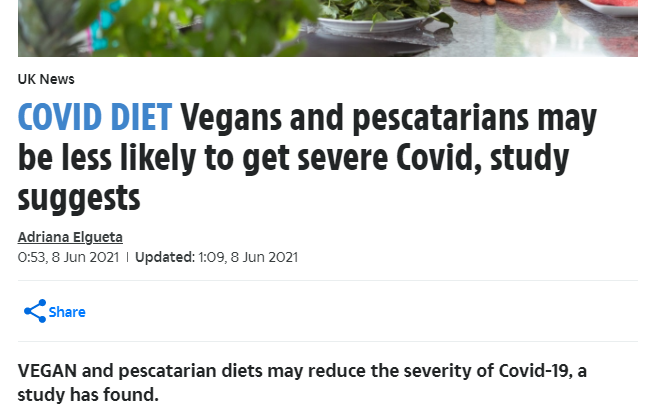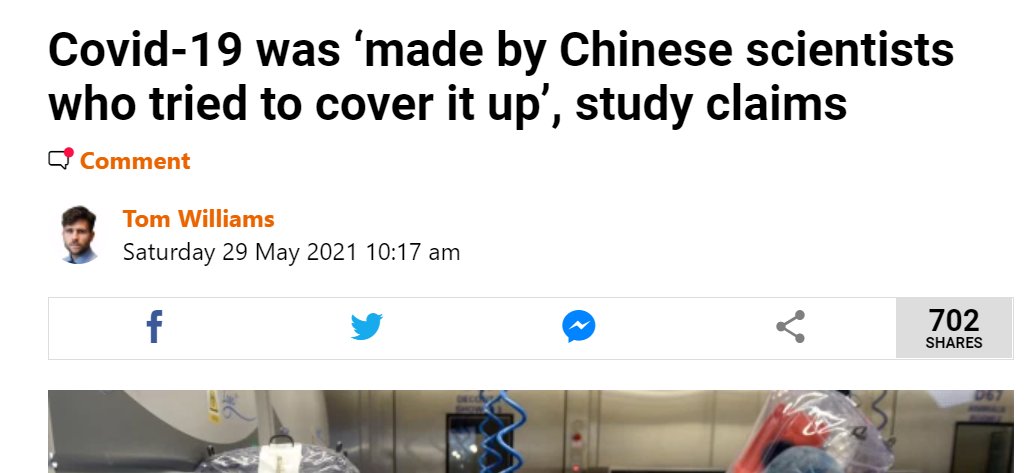
Headlines: vegetarian diets prevent severe COVID!
Study: cross-sectional survey-based investigation of an online sample of healthcare workers shows some interesting associations
The headlines are wildly silly 1/n



Study: cross-sectional survey-based investigation of an online sample of healthcare workers shows some interesting associations
The headlines are wildly silly 1/n




2/n The study is here, and fun for a quick read. Basically, a group of researchers surveyed healthcare workers in July-Sept 2020 and asked them stuff about their diet and COVID nutrition.bmj.com/content/early/…
3/n This appears to be the 3rd or 4th study published from that survey. The authors basically found that, after controlling for a couple of confounders, there was an association between self-reported diet and risk of severe COVID-19 

3.5/n (As a minor bugbear, the authors report this as a case-control study but that's not true because they didn't identify their participants based on COVID-19 status they just recruited healthcare workers to do their survey so it should be called a cross-sectional cohort) 





4/n Anyway, regardless of the study type, it definitely doesn't support the headlines
Firstly, there's the population. This study was almost exclusively comprised of middle-aged, white doctors
Firstly, there's the population. This study was almost exclusively comprised of middle-aged, white doctors

5/n We can quibble about generalizability, but as a general rule if ~80% of your population is a single very specific demographic, it's hard to say much about populations based on that sample
6/n Secondly, there's the issue with unmeasured confounding. The study only asked people about a small number of covariates, but there are ~dozens~ of potentially important things that this could've missed 

7/n Ignoring the obvious things like income, we might be worried that level of exposure to COVID-19 cases could cause people to have a higher risk of COVID-19, but that information wasn't included in the model
8/n There's also some indications in the study itself that the survey data (collected online) might not be very good as well
For example, of the 568 people who report having COVID-19, 33% say that they had a NEGATIVE COVID-19 test

For example, of the 568 people who report having COVID-19, 33% say that they had a NEGATIVE COVID-19 test


8.5/n This may have been because the definition of a COVID-19 'case' used in the study is very broad. It appears that anyone with any symptoms consistent with COVID-19 would be a case here, regardless of testing 

9/n When the researchers excluded these PCR-negative cases from their model, the statistically significant association between vegetarian diets largely disappeared 👀👀👀 

10/n Anyway, the headlines saying that vegetarian diets reduce the risk of severe COVID-19 are rather ridiculous. This study just can't prove that
11/n A better headline might be "middle-aged white doctors who report eating vegetarian diets at slightly reduced risk of reporting COVID-19 symptoms, study suggests"
Not quite as impressive, perhaps, but a bit more accurate
Not quite as impressive, perhaps, but a bit more accurate
12/n Oh, also, forgot to mention that the headline "73%" reduced risk is a relative risk, if you calculate the absolute risk difference for severe COVID-19 between the vegetarians and everyone else it works out to be about 4% so there's that too
• • •
Missing some Tweet in this thread? You can try to
force a refresh













